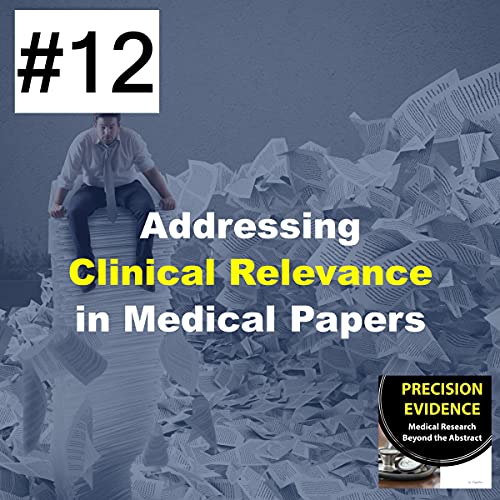Clinical Trials & Surrogate Outcomes
Looking for clinical relevance means looking for a lot of details.
A crucial part of that is looking at WHAT is compared with WHAT
But what if a comparison is not clinically relevant - what do you do then?
And how about studies using surrogate outcomes perhaps even approved by the FDA - they must be clinically relevant - but are they?
In this episode, we talk about how to navigate this and find the best available research
You don’t want to miss this episode
Get the Precision Evidence Newsletter https://bit.ly/3tLBx3Z
LINKS:
Assessment of Overall Survival, Quality of Life, and Safety Benefits Associated With New Cancer Medicines Supplemental content, JAMA Oncology (2017) https://jamanetwork.com/journals/jamaoncology/fullarticle/2594542
FDA Approved Surrogate Endpoints: https://www.fda.gov/drugs/development-resources/table-surrogate-endpoints-were-basis-drug-approval-or-licensure
Virtual Reality Smartphone-Based Intervention for Smoking Cessation: Pilot Randomized Controlled Trial on Initial Clinical Efficacy and Adherence https://www.jmir.org/2020/7/e17571/
NOTES:
- Finding clinically relevance in what is compared with what in a clinical trial
- How can we know what a relevant comparison is?
- Different kinds of comparisons in clinical research
- The pro and cons of surrogate endpoints
- Examples of surrogate endpoints you should avoid
- Outcomes in oncology research
- FDA rules
- When is information from placebo trials relevant - and when isn’t it relevant
- Research with no comparator, when can that be useful?
GET THE ABSTRACT SCREENING TOOL
It can be a challenge to screen papers for clinical relevance. As we go beyond the abstract in this podcast, we have created a screening tool to use when reading an abstract from a clinical research paper.
Using that tool enables you to quickly screen an abstract from a medical journal for clinical relevance selecting only those you want to read. At the same time, you will know why you skipped the rest. Get it at our website https://www.precision-evidence.com
Contact us at email: podcast@precision-evidence.com,
Twitter @PrecisionEBM,
You can learn more at our website, where you can also leave us a voice message.
Website: www.precision-evidence.com
Hosts:
Dr. Kim Kristiansen, M.D: @KKristiansenMD & https://www.linkedin.com/in/kim-kristiansen
JG Staal: @HealthyEvidence
Music thanks to mixkit.co
 Jul 27 202118 mins
Jul 27 202118 mins 13 mins
13 mins 8 mins
8 mins Mar 26 202118 mins
Mar 26 202118 mins 9 mins
9 mins 15 mins
15 mins Jan 15 202119 mins
Jan 15 202119 mins 14 mins
14 mins